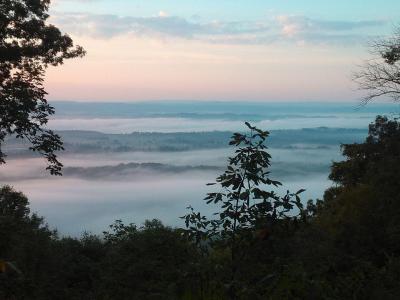
(Photo of mountains in Lewisburg, WV courtesy Donna K. Becher.)
Today we have a post from Donna K. Becher, a diocesan board member of Catholic Campaign for Human Development, former chair of Catholic Committee of Appalachia, a spiritual director with West Virginia Institute for Spirituality, and a retired speech language pathologist. She resides in Charleston, West Virginia.
To dwell within these mountains is to experience – in their height, God’s majesty; -in their weight, God’s strength; -in their hollows, God’s embrace; -in their waters, God’s cleansing; -in their haze, God’s mystery. These mountains are truly a holy place. (At Home in the Web of Life, 1995) [1]
The Appalachian Mountain Range is a jewel of creation, one of the most biodiverse systems in the country. I feel truly at home in my home state of West Virginia amid these mountains. But environmental justice is not just about mountains, rivers, trees, and animals facing extinction, but the PEOPLE.
Here, in West Virginia, summer temperatures have crept upward over the years—hotter, for longer. And it’s been rainier.[2] A friend whose home was destroyed in a catastrophic flood in 2016, talks of living where 1000-year floods now seem to happen every 4 or 5 years. Indeed, on that June day just a few years ago, it rained more than 10 inches over 12-18 hours.[3] More than 2500 West Virginia homes were destroyed and 1500 severely damaged. Twenty-three people lost their lives.[4] FEMA suggested in 2018 that “this sort of rain event and flooding may occur more frequently than has previously been expected.”
Beyond global warming, there are local threats that contribute to these changes. Mountaintop removal mining, which explodes mountains and dumps rubble into streams, casts a deep shadow. Drinking water is poisoned from mine runoff. Dangerously gigantic coal slurry impoundments sometimes crumble, sending the slurry rushing into towns. Residents living close to mining operations experience greater risks to their health. And more recently, fracking has taken hold, leading to some communities suffering the effects of chemical-laden “drinking” water.
I am one of the lucky ones. I can leave town or stay with family when the summer gets too hot or the creek starts to rise. I can buy bottled water if I need to. But many others cannot. We must acknowledge that the increasing intensity and frequency of floods, hurricanes, and fires destroy more than land—they often destroy the lives of the most vulnerable in our society. These are our brothers and sisters who have far fewer options when it comes to safety.
Pope Francis, in his 2015 Encyclical Laudato Si, says, “We are faced not with two separate crises, one environmental and the other social, but rather with one complex crisis which is both social and environmental.”[5]
In the wake of the Coronavirus Pandemic, Pope Francis asks us some hard questions. “Will we adopt, as an international community, the necessary measures to stop the devastation of the environment, or will we continue to deny the evidence of this devastation? Are we willing to change our style of life that submerges so many in poverty, by promoting and encouraging a more austere and human lifestyle that makes possible a more equitable sharing of resources?”[6]
These mountains and all of our natural resources were built over time, over many generations. It often feels like our actions are tearing them down overnight.
Indeed, as we rebuild from the pandemic, we must consider Pope Francis’ questions seriously. Pope Francis calls us to instead build, “a civilization of love… a civilization of hope.” This civilization “has to be built daily,” and requires “the commitment of everyone.” [7]
Let’s vigorously support the hope that some political and spiritual world leaders provide for us today. Psalm 140:12 tells us, “I know that the Lord will maintain the cause of the afflicted and justice for the poor.” [8]
We must invite everyone to join us in working to make our mountains, our cities, our world, more just and equitable for all.
[1]At Home in the Web of Life: A Pastoral Message on Sustainable Communities in Appalachia: Catholic Committee of Appalachia – Combined Edition 2007
[2]https://en.wikipedia.org/Climate_change_in_West_Virginia
[3]Ibid.
[4]West Virginia Encyclopedia (www.wvencyclopedia.org/articles/2443)
[5]Laudato Si: On Care for Our Common Home Chapter 4, Paragraph 139
[6]America Magazine (https://www.americamagazine.org/faith/2020/04/17/pope-francis-shares-his-vision-covid-19-aftermath)
[7]ibid
[8]New Revised Standard Version Bible: Catholic Edition 1993





